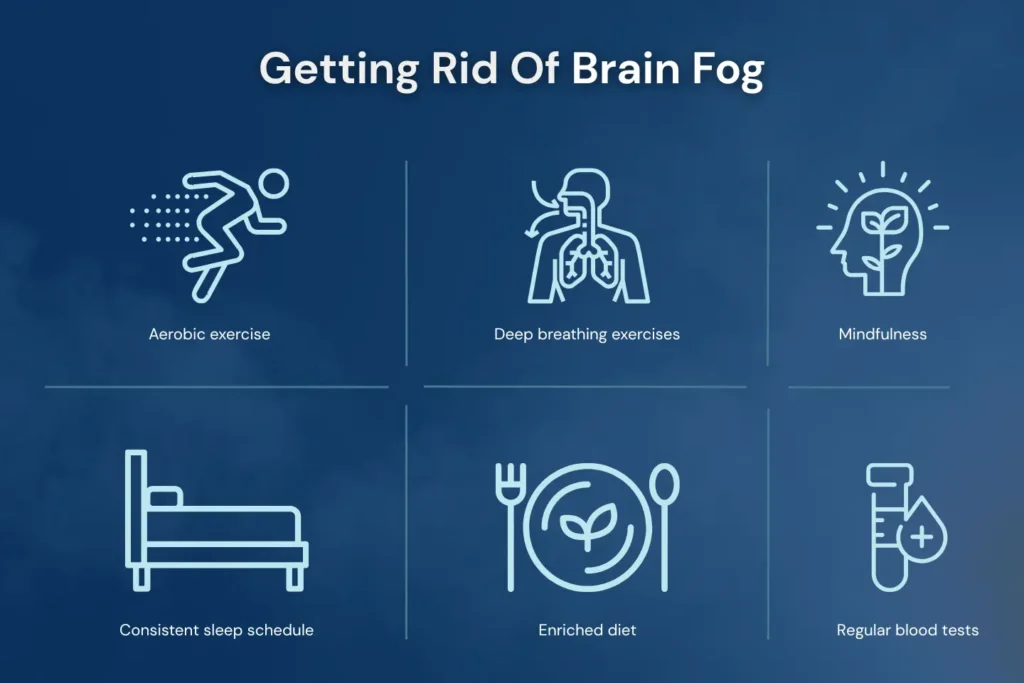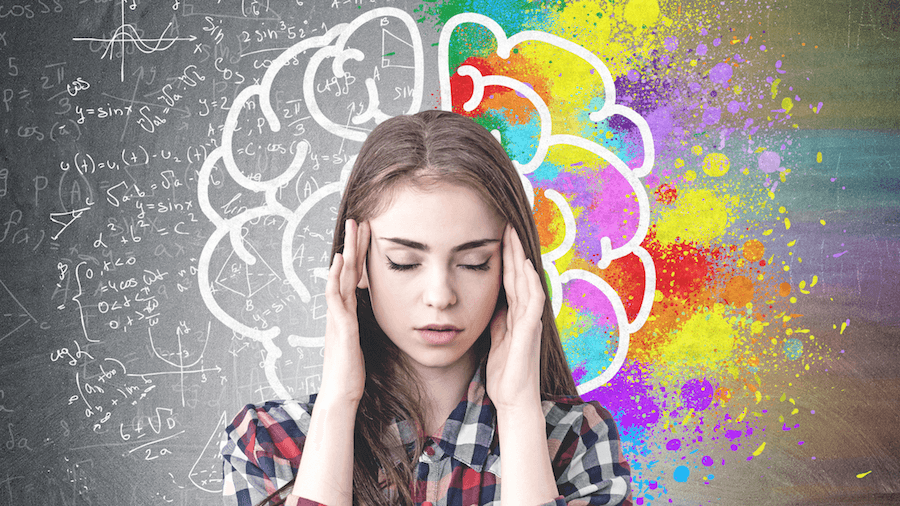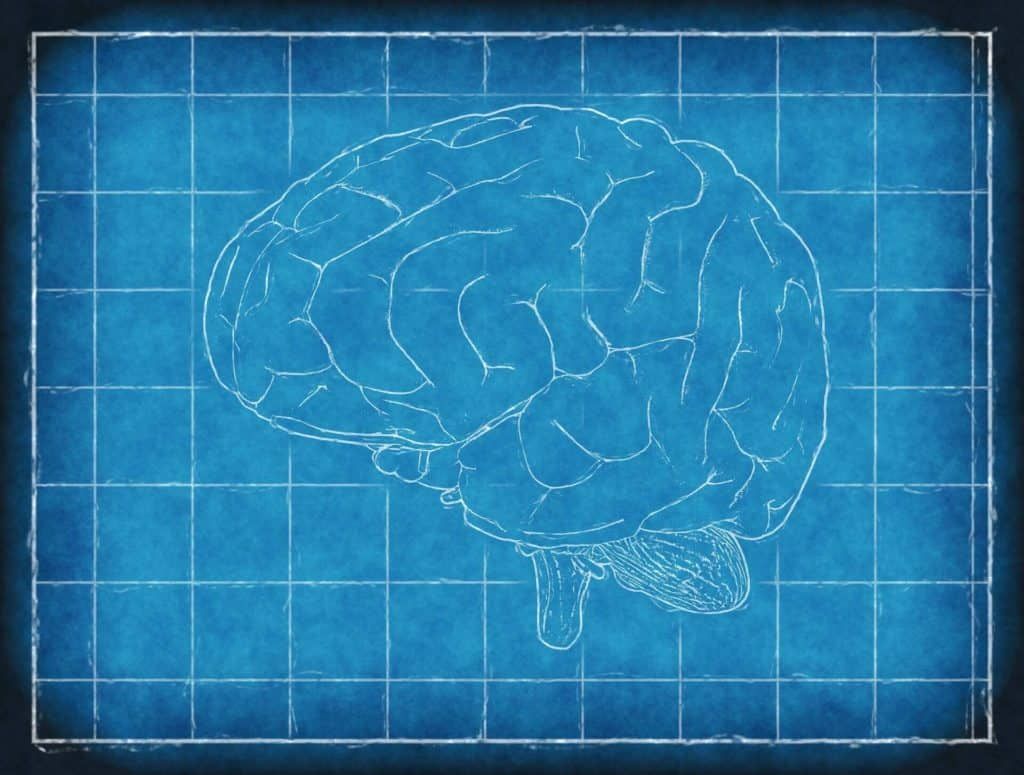That frustrating feeling when your thoughts aren't sharp, your memory feels unreliable, and focusing is a struggle? That's brain fog. While not a medical condition, it’s a common symptom that signals some underlying imbalance. Mental cloudiness can significantly impact your daily life. Understanding its roots is the first step to true clarity. This article unpacks the reasons behind brain fog and delivers practical, expert-proven strategies to help you regain mental sharpness and focus.
What Causes Brain Fog?
Brain fog is when your thinking, memory, or focus isn’t as sharp as usual.
Rather than a condition, it’s a symptom that manifests with different health issues.
Brain fog can be caused by numerous factors, depending on the underlying health condition:
- Depression and anxiety that affect focus and mental clarity
- Low levels of sleep
- Insufficient physical activity
- Multiple sclerosis-related nerve damage
- Muscle and joint pain
- A diet lacking essential vitamins and minerals
- Certain medicines (eg, for arthritis or cancer)
- Hormonal fluctuations (eg, estrogen) during menopause
- Side effects from cancer treatments
- Low red blood cell count in anaemia
- Fluctuating blood sugar levels in diabetes
Can Allergies Cause Brain Fog?
Yes, allergies can cause brain fog by affecting sleep and making breathing harder at night.
Nasal congestion and sinus inflammation often impact restfulness, resulting in tiredness and difficulty concentrating the next day.
Allergies can set off sneezing, coughing, and a heavy head, impacting sleep.
Allergic reactions also release chemicals that cause fatigue and swelling in the nasal passages.
This mix of disrupted sleep and ongoing congestion can lead to brain fog, a foggy, low-energy feeling.
How To Get Rid Of Brain Fog: 6 Expert Tips
Experts highlight several proven strategies for reducing brain fog and restoring mental clarity. Here are some essential tips to follow.
Establish a Consistent Sleep Schedule
Setting a healthy bedtime and morning routine while aiming for 7 to 9 hours of sleep helps maintain your circadian rhythm, supporting better sleep quality.
Quality sleep has been shown to improve mood, combat stress, and sharpen thinking.
Bright screens and heavy meals before bed can keep your body awake longer than you’d like.
If you can’t fall asleep after 20 minutes of lying down, try a relaxing activity like reading a book or lightly stretching.
Incorporate Aerobic Exercise
Regular physical activity enhances blood flow to the brain, helping with memory, focus, and problem-solving.
Brisk walking, swimming, or light housework contribute to the goal: 20 minutes a day or 150 minutes a week of moderate physical activity.
Staying active also supports better sleep and reduces anxiety and depression.
Try Deep Breathing Exercises
Breathing techniques can reduce stress, easing the impact of brain fog on your concentration and memory.
Breathing exercises or guided meditation may calm your mind and improve cognitive clarity.
Adopt Mindfulness Habits For Destressing
Mindfulness practices like daily walks or engaging in enjoyable activities can help manage stress.
A calmer mind supports clearer thinking and better overall brain function by keeping cortisol levels in check.
Enrich Your Diet
Foods rich in B vitamins, omega-3 fatty acids, and antioxidants support mental clarity and brain health.
These include:
- Fatty fish like salmon
- Nuts like walnuts
- Seeds such as flaxseeds
- Fresh fruits
- Colorful vegetables
- Lean sources of protein
Avoiding processed foods and stabilizing blood sugar levels can help prevent energy drops that interfere with focus.
Get Regular Blood Tests
Brain fog can sometimes stem from nutritional deficiencies or other underlying issues.
Regular blood tests can reveal and address imbalances appropriately for better cognitive health.

Supplements To Help Manage Brain Fog
Certain clinically studied supplements can help in managing brain fog linked to nutrient deficiencies and mental fatigue, such as:
Omega-3 Fatty Acids
Omega-3 fatty acids are essential fats.
Two of their most well-researched forms are EPA (eicosapentaenoic acid) and DHA (docosahexaenoic acid), both critical for brain health.
In a study of 176 adults with low omega-3 intake, taking 1.16 g of DHA daily for 6 months improved episodic and working memory.
A review of 26 studies showed that omega-3s with at least 60% EPA content and a dose of 1 g per day helped reduce depressive symptoms.
Vitamin D
Low vitamin D levels may contribute to cognitive issues and depressive symptoms, such as poor concentration and memory.
Depression often occurs along with a vitamin D deficiency, and supplements could help improve mood and reduce brain fog.
In a study, 42 postmenopausal women with low vitamin D who took 2,000 IU daily for a year outperformed those on 600 or 4,000 IU in memory and learning tests.
Magnesium
Magnesium supports both energy production and the functioning of the nervous system.
Low magnesium intake can worsen brain fog, especially under stress.
A study found that out of nearly 2500 individuals over 60, those with higher magnesium levels had better memory and attention and a lower risk of cognitive decline.
Magnesium supplements may also help with anxiety and depression symptoms, which are often linked to mental fatigue and poor focus.
B Complex Vitamins
Deficiencies in B vitamins like B6, B12, and folate can lead to poor memory and concentration.
A study of 202 patients with low vitamin B12 levels revealed that:
- 84% reported significant symptom improvement upon supplementation
- 78% reported improvements in their cognitive state
Of the 44 patients who didn’t report symptom relief, 26 showed cognitive improvement. Only 18 showed no change in MMSE scores.
High-quality B-complex supplements may help correct these issues and manage brain fog.
L-theanine
Found in green tea, L-theanine may enhance mental alertness and reduce stress.
In a study of 69 adults aged 50–69, a 100.6 mg dose of L-theanine improved working memory and reaction time.
Another study found that 200 mg per day improved sleep and reduced stress-related symptoms compared to a placebo.
Thus, L-theanine could target stress and poor sleep, which are significant triggers for brain fog.
Vitamin C
Vitamin C is known to support immune health and brain function.
A study with 80 healthy adults found that those with sufficient vitamin C levels scored higher in attention, memory, and reaction time than those with low levels.
Another 2021 study on people with mild depression found that vitamin C helped boost their mood to an extent, which could support clearer thinking.
When To Call A Doctor
It might be time to consult a doctor if brain fog:
- Frequently disrupts your daily routine
- Makes you misplace items
- Makes it harder to complete simple tasks
- Affects your focus during conversations
Brain fog can happen to many people, but a medical evaluation can help pinpoint the cause.
FAQs About How To Get Rid Of Brain Fog
What Is Brain Fog A Symptom Of?
Brain fog is commonly linked to hormone changes, sleep issues, vitamin deficiencies, and long-term stress that affects your mental clarity.
Health conditions like fibromyalgia, depression, dementia, dehydration, and hypothyroidism may also result in brain fog.
In some cases, certain medications may be the reason behind persistent mental cloudiness.
Which Vitamin Helps With Brain Fog?
Vitamins B12, C, and D may help with brain fog.
Some research suggests that getting enough of these vitamins can support cognitive function.
Conversely, a deficiency in these nutrients might make brain fog symptoms worse.
What Deficiency Causes Brain Fog?
Brain fog can be linked to deficiencies in several key nutrients.
Low levels of vitamin D, B12, iron, and omega-3 fatty acids are commonly associated with problems like poor concentration and mental fatigue.
In some cases, magnesium, vitamin C, and choline deficiencies may also play a role, though more research is needed to confirm their impact.
How To Test For Brain Fog?
There isn’t a single definitive test for brain fog, mainly because a wide range of underlying issues can trigger it.
But if you’re noticing problems with memory or concentration, there is a way to get evaluated.
Doctors often turn to a tool called the Montreal Cognitive Assessment, or MoCA.
It’s a quick, in-clinic test designed to check how well your memory and concentration are working.
Summary: How To Get Rid Of Brain Fog
- Brain fog is a symptom of poor memory, focus, or clarity.
- It is often caused by a lack of sleep, stress, poor diet, hormonal shifts, or medications.
- Allergies can also lead to brain fog by affecting sleep and causing nasal inflammation.
- Getting quality sleep and daily aerobic exercise can help improve brain function.
- Deep breathing, mindfulness, and a nutrient-rich diet high in omega-3s, B vitamins, and antioxidants also help reduce brain fog.
- Supplements that could improve brain function include omega-3s, vitamin D, B complex, magnesium, L-theanine, and vitamin C.
- If brain fog impacts your everyday activities, consider visiting a medical expert for a proper diagnosis.
Others Are Also Reading

Top 7 Vitamins and Nutrients For Clearing Brain Fog

Do-it-yourself (DIY) Brain Fog Test

Best BDNF Supplements To Boost Brain Function
References
https://www.healthdirect.gov.au/brain-fog
https://www.healthline.com/health/can-allergies-make-you-tired
https://www.uhc.com/news-articles/healthy-living/6-ways-to-manage-brain-fog
https://pubmed.ncbi.nlm.nih.gov/23515006
https://pmc.ncbi.nlm.nih.gov/articles/PMC6683166
https://pmc.ncbi.nlm.nih.gov/articles/PMC7164532
https://link.springer.com/article/10.1007/s00394-020-02267-4
https://pmc.ncbi.nlm.nih.gov/articles/PMC7077099
https://pmc.ncbi.nlm.nih.gov/articles/PMC8080935
https://pmc.ncbi.nlm.nih.gov/articles/PMC6576271
https://pmc.ncbi.nlm.nih.gov/articles/PMC6454201
https://pubmed.ncbi.nlm.nih.gov/33932734
https://www.healthline.com/nutrition/can-not-enough-nutrients-cause-brain-fog
https://www.medicalnewstoday.com/articles/anxiety-and-brain-fog
https://www.unitypoint.org/news-and-articles/how-to-think-clearly-again-natural-fixes-for-brain-fog





